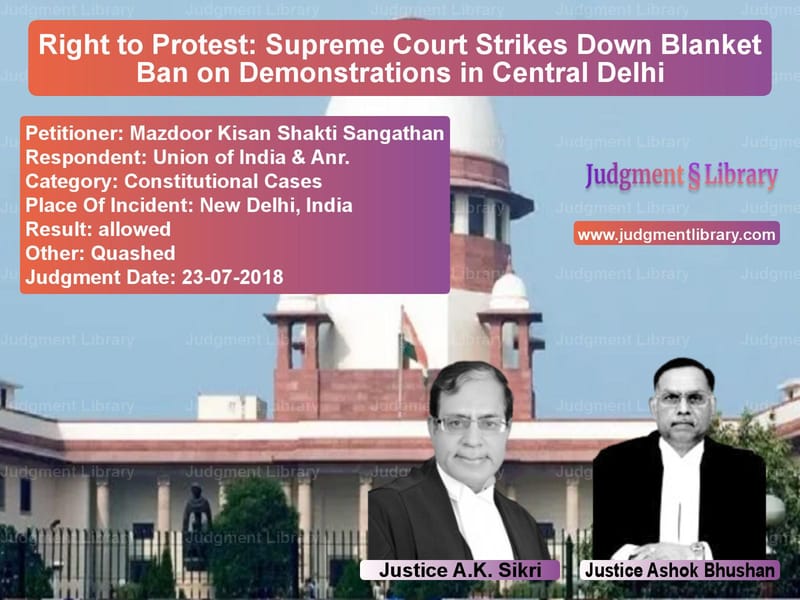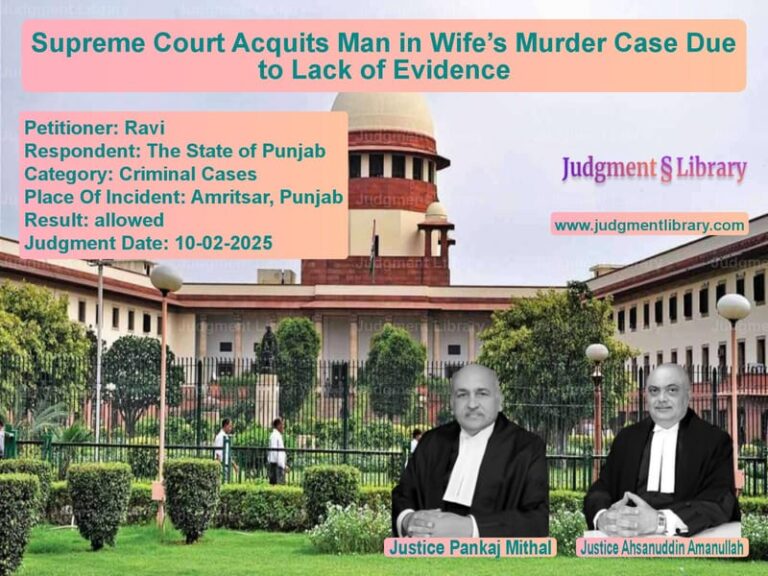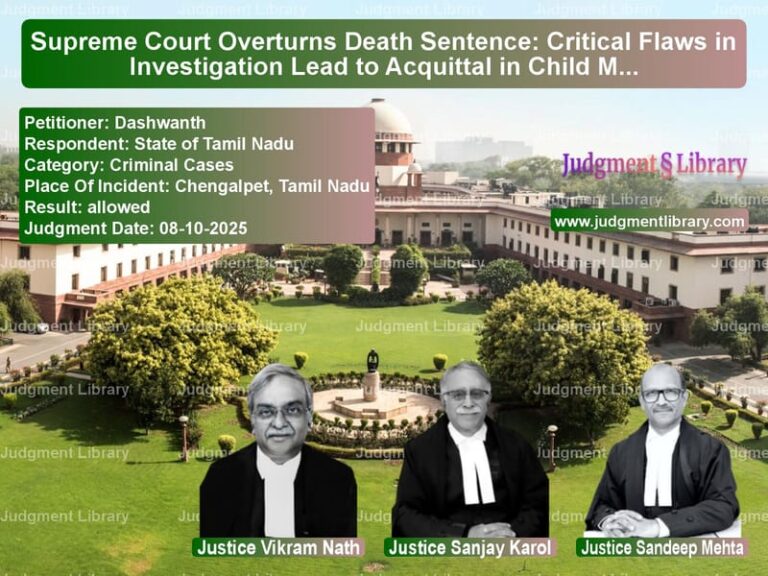Right to Protest: Supreme Court Strikes Down Blanket Ban on Demonstrations in Central Delhi
The landmark case Mazdoor Kisan Shakti Sangathan v. Union of India addressed a significant constitutional issue concerning the fundamental right to protest. The Supreme Court ruled that the blanket imposition of Section 144 of the Code of Criminal Procedure (Cr.P.C.), which prohibited public gatherings in Central Delhi, was unconstitutional and an infringement on the right to peaceful assembly under Article 19(1)(b) of the Indian Constitution.
Background of the Case
The case was filed as a Public Interest Litigation (PIL) by the Mazdoor Kisan Shakti Sangathan (MKSS), a grassroots organization advocating for farmers and laborers. The petition challenged the repeated use of Section 144 Cr.P.C. in Central Delhi, particularly around Parliament House, North and South Block, and the Central Vista Lawns, which effectively created a perpetual ban on protests in the area.
The petitioner contended that this ban had the effect of curtailing citizens’ rights to hold peaceful demonstrations, processions, and dharnas, which are essential democratic tools for voicing dissent.
Petitioner’s Arguments
- The continuous imposition of Section 144 Cr.P.C. amounted to an arbitrary and unconstitutional restriction on the fundamental right to peaceful assembly.
- Under Article 19(1)(b), every citizen has the right to assemble peacefully and protest against government actions.
- Protests have historically taken place in locations such as the Boat Club, Jantar Mantar, and Ram Lila Maidan, which have been significant centers for public demonstrations.
- By banning protests in key areas of New Delhi, the authorities were stifling dissent and preventing citizens from raising their voices before the government.
- The petitioner also cited international conventions like the Universal Declaration of Human Rights and the International Covenant on Civil and Political Rights to argue that the right to peaceful protest is globally recognized.
Respondent’s Arguments
- The government defended the restrictions, arguing that they were necessary to maintain public order, security, and smooth traffic movement in sensitive areas.
- Section 144 was invoked based on intelligence reports indicating potential threats to public safety and national security.
- The authorities contended that alternative locations such as Ram Lila Maidan were available for demonstrations.
- The respondents emphasized that Delhi, being the national capital, frequently hosts foreign dignitaries, and any disruption caused by protests could damage India’s global reputation.
Supreme Court’s Observations
The Supreme Court acknowledged the crucial role of peaceful protests in a democracy. The bench observed that:
- While public order is important, a complete ban on protests in an entire area is disproportionate and unconstitutional.
- Repeated imposition of Section 144 Cr.P.C. without specific, credible threats amounts to an abuse of power.
- Citizens have the right to assemble peacefully and air their grievances, subject to reasonable restrictions.
- The state can impose certain conditions to ensure that protests do not disrupt essential services, but an outright ban is excessive.
- Jantar Mantar and Boat Club have historically served as key sites for protests, and the government must allocate designated protest zones.
Final Judgment
The Supreme Court quashed the repeated imposition of Section 144 Cr.P.C. and directed the authorities to formulate new guidelines for regulating protests while ensuring minimal disruption to public order.
The ruling emphasized that:
- Citizens must be allowed to hold peaceful demonstrations in designated areas without undue restrictions.
- The government must create a clear and transparent policy for granting permissions to hold protests.
- While maintaining security is paramount, authorities must balance public order with the fundamental rights of citizens.
The judgment sets a crucial precedent in protecting the democratic right to dissent while maintaining public order. It reinforces that any restriction on fundamental rights must be justified, proportionate, and reasonable.
Petitioner Name: Mazdoor Kisan Shakti Sangathan.Respondent Name: Union of India & Anr..Judgment By: Justice A.K. Sikri, Justice Ashok Bhushan.Place Of Incident: New Delhi, India.Judgment Date: 23-07-2018.
Don’t miss out on the full details! Download the complete judgment in PDF format below and gain valuable insights instantly!
Download Judgment: Mazdoor Kisan Shakti vs Union of India & Anr Supreme Court of India Judgment Dated 23-07-2018.pdf
Direct Downlaod Judgment: Direct downlaod this Judgment
See all petitions in Fundamental Rights
See all petitions in Public Interest Litigation
See all petitions in Separation of Powers
See all petitions in Judgment by A.K. Sikri
See all petitions in Judgment by Ashok Bhushan
See all petitions in allowed
See all petitions in Quashed
See all petitions in supreme court of India judgments July 2018
See all petitions in 2018 judgments
See all posts in Constitutional Cases Category
See all allowed petitions in Constitutional Cases Category
See all Dismissed petitions in Constitutional Cases Category
See all partially allowed petitions in Constitutional Cases Category







